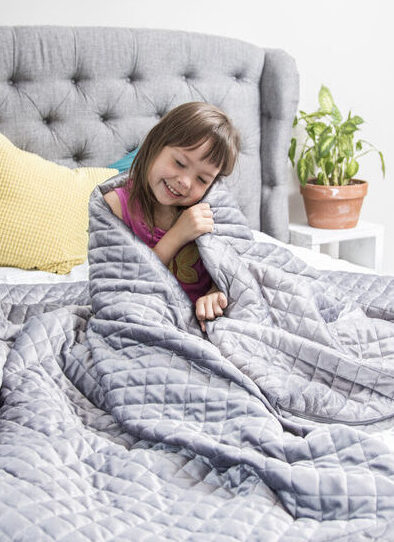Weighted blankets and stuffed animals have become a popular item. They have been used to help alleviate stress and anxiety as well as address sensory issues. With all the supposed benefits of weighted items, you might be wondering if you can safely use them with your kids. Dr. Jennifer Manning, neonatologist at Akron Children’s, explains what parents should know about weighted blankets and stuffed animals for kids. 
“Weighed blankets have received a lot of hype, because they are advertised to make you feel better and sleep better,” Dr. Manning explains. “They are not a new concept. From a medical standpoint, they can be used as a complementary treatment to help medical conditions like anxiety, autism, and insomnia. “The theory behind weighted blankets is that they use deep pressure stimulation to potentially improve your mood, reduce stress, and help you sleep better at night. The deep pressure stimulation is thought to increase production of serotonin, a mood elevator, reduce nighttime levels of cortisol, and increase melatonin, which helps you sleep.”
The stress and uncertainty of the last few years, have made the idea of weighted items more appealing to parents, said Dr. Manning.
“I think people are looking for something to help them relax and improve their sleep as well as the sleep of their children,” she said.
Despite their wide appeal, Dr. Manning says that weighted blankets and stuffed animals should not be used by all children. Each child’s medical status and development should be considered.
Manning stresses the importance of reading the manufacturers’ recommendations. You shouldn’t use a weighted blanket or item if your child:
- Is an infant or toddler younger than 4
- Has sleep apnea or other breathing issues
- Has circulation problems, diabetes or a developmental delay.
Also, you should never:
- Cover a child’s face with the weighted item
- Wrap the item tightly around a child
- Or use the item with someone who is too small or physically unable to remove the weighted item independently.
Dr. Manning notes that children with autism spectrum disorders, sensory processing disorders, anxiety, ADHD, depression, and post-traumatic stress disorder may benefit best from the appropriate use of weighted items.










